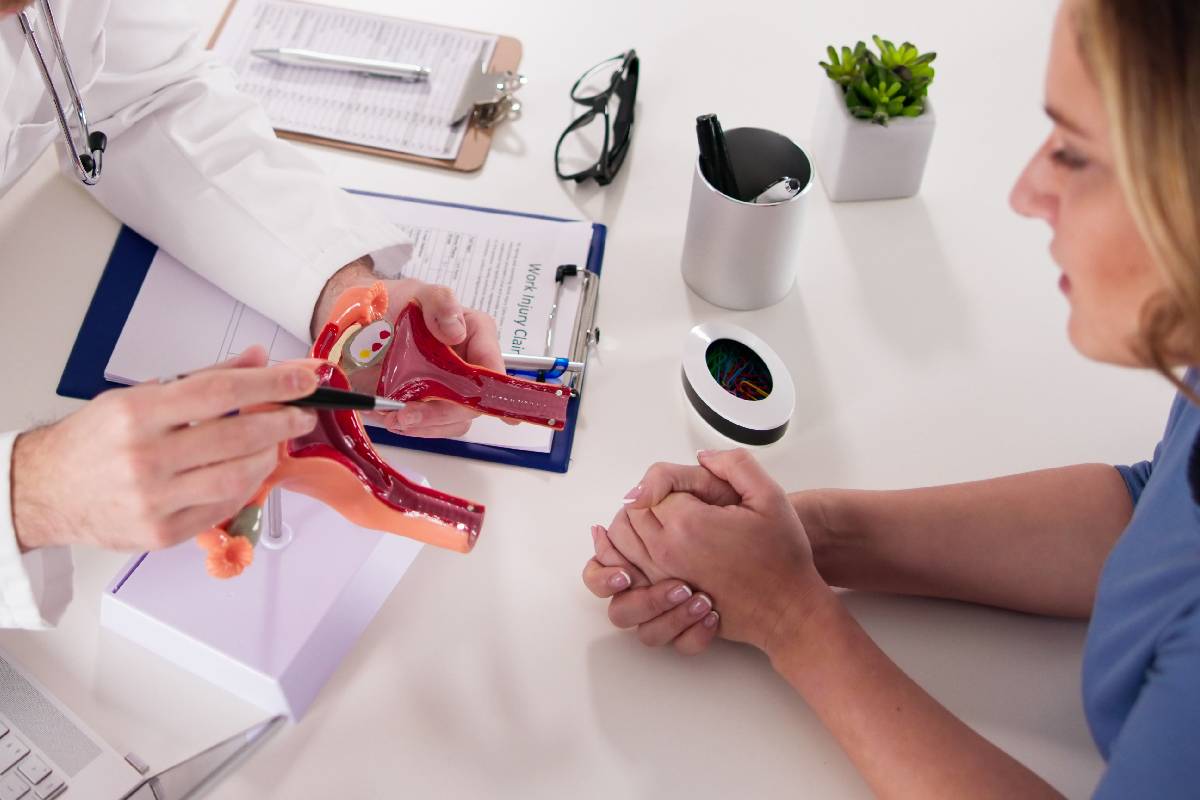
Ovarian cysts are fluid-filled sacs that develop on or within the ovaries. While many cysts are harmless and go away on their own, some may cause discomfort or complications. Understanding the different types of ovarian cysts, their symptoms, and treatment options can help you make informed decisions about your health. At A Woman’s Place in Naples, FL, we provide expert diagnosis and management to ensure your well-being.
Types of Ovarian Cysts
There are several types of ovarian cysts, categorized based on how they develop:
Functional Cysts
Functional cysts are the most common and occur as part of the normal menstrual cycle. They are typically harmless and often resolve without treatment.
- Follicular Cysts: These occur when a follicle (which houses the egg) does not release an egg during ovulation. The follicle continues to grow, forming a cyst.
- Corpus Luteum Cysts: After an egg is released, the follicle transforms into the corpus luteum, which produces hormones. Sometimes, fluid builds up inside, creating a cyst that usually resolves on its own within a few weeks.
Pathological Cysts
These cysts are not related to the menstrual cycle and may require medical attention.
- Dermoid Cysts (Mature Cystic Teratomas): These cysts contain tissues such as hair, fat, or even teeth because they develop from embryonic cells. They are usually benign but can grow large and require removal.
- Endometriomas: These cysts develop due to endometriosis, a condition where tissue similar to the uterine lining grows outside the uterus. They are often filled with dark, thick menstrual blood and may cause significant pain.
- Cystadenomas: These cysts form on the surface of the ovary and may be filled with watery or mucous-like fluid. While usually benign, they can grow large and cause discomfort.
Symptoms of Ovarian Cysts
Most ovarian cysts do not cause symptoms, but when they do, they can include:
- Pelvic pain or pressure, especially if a cyst grows large or ruptures
- Bloating or a feeling of fullness in the lower abdomen
- Irregular menstrual cycles or changes in period flow
- Pain during intercourse, particularly if the cyst puts pressure on surrounding tissues
In rare cases, an ovarian cyst can cause severe pain, nausea, or dizziness if it ruptures or causes ovarian torsion (twisting of the ovary), which requires immediate medical attention.
Treatment Options
Treatment for ovarian cysts depends on the type, size, and symptoms. Common approaches include:
- Watchful Waiting: Many small, functional cysts resolve on their own within a few menstrual cycles. Your doctor may recommend periodic ultrasounds to monitor their progress.
- Medication: Birth control pills may help prevent new cysts from forming by regulating hormone levels. However, they do not shrink existing cysts.
- Surgery: If a cyst is large, persistent, causing pain, or appears suspicious, surgical removal may be necessary. This can be done through minimally invasive laparoscopy or, in more complex cases, open surgery.
Taking Control of Your Ovarian Health
Ovarian cysts are a common part of reproductive health, and in most cases, they are nothing to worry about. However, if you experience persistent pain or unusual symptoms, seeking medical evaluation is essential. At A Woman’s Place in Naples, FL, we provide expert care and guidance to help you maintain your reproductive well-being.
For professional evaluation and treatment of ovarian cysts, contact A Woman’s Place in Naples, FL:
https://www.awpnaples.com/contact/
Further Reading
Women’s Health – Ovarian Cysts
https://womenshealth.gov/a-z-topics/ovarian-cysts#:~:text=Postmenopausal%20women%20with%20ovarian%20cysts,abnormal%20(unusual)%20vaginal%20bleeding.
Ovarian cysts are fluid-filled sacs that develop on or within the ovaries. While many cysts are harmless and go away on their own, some may cause discomfort or complications. Understanding the different types of ovarian cysts, their symptoms, and treatment options can help you make informed decisions about your health. At A Woman’s Place in Naples, FL, we provide expert diagnosis and management to ensure your well-being.
Types of Ovarian Cysts
There are several types of ovarian cysts, categorized based on how they develop:
Functional Cysts
Functional cysts are the most common and occur as part of the normal menstrual cycle. They are typically harmless and often resolve without treatment.
- Follicular Cysts: These occur when a follicle (which houses the egg) does not release an egg during ovulation. The follicle continues to grow, forming a cyst.
- Corpus Luteum Cysts: After an egg is released, the follicle transforms into the corpus luteum, which produces hormones. Sometimes, fluid builds up inside, creating a cyst that usually resolves on its own within a few weeks.
Pathological Cysts
These cysts are not related to the menstrual cycle and may require medical attention.
- Dermoid Cysts (Mature Cystic Teratomas): These cysts contain tissues such as hair, fat, or even teeth because they develop from embryonic cells. They are usually benign but can grow large and require removal.
- Endometriomas: These cysts develop due to endometriosis, a condition where tissue similar to the uterine lining grows outside the uterus. They are often filled with dark, thick menstrual blood and may cause significant pain.
- Cystadenomas: These cysts form on the surface of the ovary and may be filled with watery or mucous-like fluid. While usually benign, they can grow large and cause discomfort.
Symptoms of Ovarian Cysts
Most ovarian cysts do not cause symptoms, but when they do, they can include:
- Pelvic pain or pressure, especially if a cyst grows large or ruptures
- Bloating or a feeling of fullness in the lower abdomen
- Irregular menstrual cycles or changes in period flow
- Pain during intercourse, particularly if the cyst puts pressure on surrounding tissues
In rare cases, an ovarian cyst can cause severe pain, nausea, or dizziness if it ruptures or causes ovarian torsion (twisting of the ovary), which requires immediate medical attention.
Treatment Options
Treatment for ovarian cysts depends on the type, size, and symptoms. Common approaches include:
- Watchful Waiting: Many small, functional cysts resolve on their own within a few menstrual cycles. Your doctor may recommend periodic ultrasounds to monitor their progress.
- Medication: Birth control pills may help prevent new cysts from forming by regulating hormone levels. However, they do not shrink existing cysts.
- Surgery: If a cyst is large, persistent, causing pain, or appears suspicious, surgical removal may be necessary. This can be done through minimally invasive laparoscopy or, in more complex cases, open surgery.
Taking Control of Your Ovarian Health
Ovarian cysts are a common part of reproductive health, and in most cases, they are nothing to worry about. However, if you experience persistent pain or unusual symptoms, seeking medical evaluation is essential. At A Woman’s Place in Naples, FL, we provide expert care and guidance to help you maintain your reproductive well-being.
For professional evaluation and treatment of ovarian cysts, contact A Woman’s Place in Naples, FL:
https://www.awpnaples.com/contact/
Further Reading
Women’s Health – Ovarian Cysts
https://womenshealth.gov/a-z-topics/ovarian-cysts#:~:text=Postmenopausal%20women%20with%20ovarian%20cysts,abnormal%20(unusual)%20vaginal%20bleeding.










